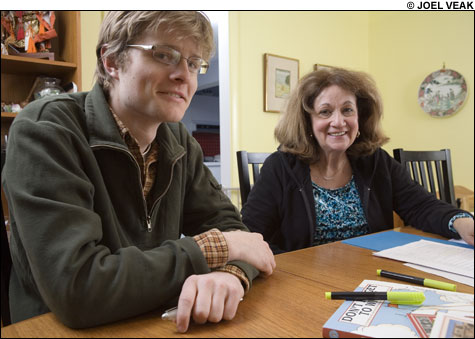
LOCAL LEADERS: Harvard student Kevin Feeney and Boston-Cambridge schools retiree Helen Jacobson are spearheading the 826 Boston cause. |
The sign outside 826 NYC, the Brooklyn-based branch of the nonprofit youth writing organization founded by Dave Eggers and Nínive Calegari in San Francisco in 2002, declares that it’s home to a full complement of superhero supplies. It offers “special programs for telepaths,” help with “your nemesis problem,” and “full capery.” Inside, the space resembles a hardware store: shelves are lined with cardboard boxes, paint cans small and large, and various jars, all of which are clearly labeled and hold basic superhero accouterments. Like a head-mounted cybernetic scope, for example, or a high compression biosprayer. You can buy gills, muscle, and antimatter. There’s hydrogen gum and superstrength hero boots. Hair DNA, shiny blonde-gray locks in a clear glass jar, is “made near Japan,” and goes for $7.
There’s so much to look at, so many labels to read, that you almost forget to wonder where the classroom space is, where the kids actually learn and write. But then a woman your age, mid 20s, walks past you toward the back of the room to a wall of shelves holding yet more superhero supplies. She pulls at the shelves — a secret door! — and disappears, the shelves closing slowly behind her. Repeating her steps, you reopen the shelf-door and find a huge classroom with tables, desks, chairs, couches, tons of books, tons of light. No matter how cynical you are, no matter how much you malign McSweeney’s or Eggers’s do-gooding, you cannot help but smile here. To be a kid and have this place be all for you? Amazing. To hang out with these diminutive fantasists, as a barely grown-up volunteer, and help give their imaginations shape? Just as cool. And this fall, Boston is slated to become the seventh chapter under the 826 National umbrella.

826 Boston will offer programs similar to those of the other chapters. It will support kids ages six to 18 in creative and expository writing. It will help teachers inspire their students to write. It will emphasize one-on-one attention. It will offer drop-in and in-school tutoring, after-school workshops, English-language help, and produce professional quality student publications.
Since the San Francisco start in 2002, 826 has expanded to five other locations — New York, Chicago, LA, Seattle, and Ann Arbor, Michigan — and now Boston. Each branch has a different theme, and a small store that sells items related to it, with proceeds going to the organization. You can buy glass eyes and custom peg legs at the Pirate Store out of 826 Valencia in San Francisco. In Seattle, the Greenwood Space Travel Supply Company “outfits adventurers, commuters, rocket scientists (professional and freelance).” The Boring Store at 826 CHI in Chicago offers surveillance gear, fake moustaches, and carrier-pigeon supplies. As of now, Boston has yet to choose a theme — robots and giants have been tossed around as possibilities — and they’re open to ideas. The Boston branch has also yet to choose a home, though Jamaica Plain or Roxbury are likely spots, says Helen Jacobson, president of the 826 Boston board.
“We’re hoping to gather a lot of people together who’ve expressed interest in the organization to start talking about potential themes,” says Kevin Feeney, one of the first 826 students in San Francisco, now in his third year at Harvard. As for whether the theme should be linked to the city, Feeney says that varies from place to place. “Some say that it’s just this fantastical space that doesn’t need to have a strong link to the city,” he says, although the way the space is designed and the concept is implemented will have some relation to Boston. “We’re trying to create a world that feels different for the students,” Feeney says, “one that engenders creativity.”
The process of bringing the organization to Boston started in 2005. 826 National heard strains of enthusiasm coming out of Boston, but no one would act as a coordinator in the application process, which involves pulling together a comprehensive community assessment, a profile of local schools, an educational leader to act as liaison between 826 and the local schools, partnerships with other literacy organizations, and space planning. So 826 National tapped Feeney to see if he’d act as the point person in the application process.
“My main task was just to meet with as many other organizations and teachers in the area and interested volunteers to get their take on how it could work in Boston,” says Feeney, 21, at Pete’s Coffee in Harvard Square.
“He’s a total hero,” says Calegari. “He fleshed out this whole reconnaissance study of the community. He showed it was crucial to Boston to have 826.” 826 National was saddled with several applications at once, including one from Austin, and Boston’s stood out above the rest. “There’s a clear volunteer force,” says Calegari, “and a clear connection to teachers. It’s the perfect place.”Calegari put Feeney, who’s now the vice-president of 826 Boston’s board, in touch with Jacobson, who just retired from 30 years in the Boston-Cambridge school systems. Jacobson, 63, helped make contact with local teachers and headmasters, and is now serving as 826 Boston president.